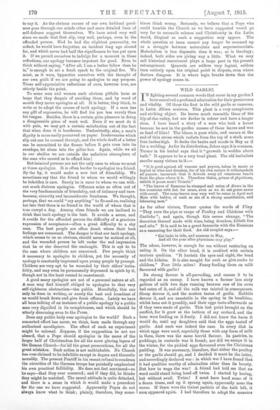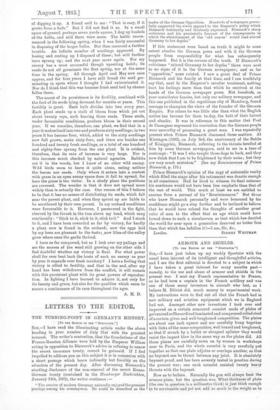WILD GARLIC.
IN fighting several common weeds that occur in my garden I have conceived a profound admiration for their persistence and vitality. Of these the first is the wild garlic or ramsons,
in Latin Alliuin ursinum, This plant is a very conepicnous and striking object. Its leaves much resemble those of the lily-of-the-valley, but are darker in colour and have a longer stem. I have heard a story of a man who took a house because he saw in the garden masses of these leaves and was so fond of lilies! The bloom is pure white, and occurs at the end of thin stems which radiate from the top of a stalk some four inches high. It decks the banks and woods in May as if for a wedding. As for its distribution, Johns says it is common.
Turner in his herbal says that it " groweth in woddes about bath." It appears to be a very local plant. The old herbalists ascribe many virtues to it :—
"It is good against all venom° and poyson, taken in meats or hoylecl in wine and drunken, for of his own nature it withstandeth all poyson: insomuch that it driveth away all venomous beasts from the place where it is. Therefore Galen, prince of physitions, calleth it poore men's Treacle."
"The loaves of Ramsons be stamped and eaten of divers in the low countries with fish for sauce, even as we do at green sauce with sorrel. The same leaves may very well be eaten in April and Male with butter, of such as are of a strong constitution, and labouring men," As for other virtues, Turner quotes the words of Pliny " They cure the pipe or roupe of Poultry and Chickens with Garlick° "; and again, though this seems strange, Tho decoction thereof made with wine, being drunken, killeth lice and nits." It is said to be a great favourite with the Russians as a seasoning for their food. An old couplet says :— "Eat leeks in tide, and ramsons in May, And all the year after physicians may play."
The odour, however, is enough for me without venturing on eating it. On the other hand, it is credited with certain noxious qualities. "It hurteth the eyes and sight, the bead and the kidnies. It is also naught for such as give sucke to children." Poor little mites I Fancy feeding them on milk flavoured with garlic !
Its strong flavour is all-pervading, and causes it to be regarded as an enemy. I have known a farmer lose sixty gallons of milk two days running because one of his cows had eaten of it, and all the milk was tainted in consequence. Sheep devour it, and the mutton tastes of garlic. Rabbits devour it, and are uneatable in the spring in its localities; whilst hens eat it greedily, and their eggs taste afterwards as if they were made of garlic. This last point brought on the conflict, for it grew at the bottom of my orchard, and tho hens were feeding on it freely. I did not know the harm it would do, until my daughters said that the eggs tasted of garlic. And such was indeed the case. In every dish iu which eggs were used, especially those with any form of milk in them, there was the same horrid flavour. In pastries, in puddings, in custards was it found; nor did we escape it in the winter, for the pickled eggs flavoured even the Christmas pudding. It was necessary, therefore, that either the poultry or the garlic should go, and I decided it must be the latter, and accordingly declared war : in which war I have found that it had qualities worthy of admiration other than its beauty. But how to wage the war! A friend had told me that no weed could stand being hoed off twine. I started by hoeing, but without avail. Twice ! I must have hoed some of it a dozen times, and up it sprang again, apparently none the worse. If there were the tiniest particle of the bulb left, it soon appeared again. I had therefore to adopt the measure of digging it up. A friend said to me : " That is easy, if it 'grows from a bulb." But I did not find it so, In a small' space of ground, perhaps seven yards square, I Aug up bushels of the bulbs, and still there were more. The battle recom- menced in the following spring, when I was fairly successful in disposing of the larger bulbs. But than occurred a further, trouble. An infinite number of seedlings appeared. By hoeing and rooting up I disposed of these; but still further 'ones sprang up ; and the next year more again. For my enemy has a most successful though upsetting habit ; its seeds do not all germinate the first spring, nor at the same time in the spring. All through April and May new ones appear, and for four years I have still found the seed ger- minating in spots where I thought I had exterminated it. Nor do I think that this was because fresh seed had by chance fallen there.
The secret of its persistence is its fertility, combined with the fact of its seeds lying dormant for months or years. This fertility is great. Each bulb divides into two every year. Each plant sends up a stalk of bloom from which jut out about twenty rays, each bearing three seeds. These seeds, under favourable conditions, produce bloom in their second year. If we consider, therefore, one plant, we find that in a year it makes itself into two and produces sixty seedlings ; in two years it has become four, which, added to the sixty seedlings now full grown, make sixty-four, and there are besides one hundred and twenty fresh seedlings, or a total of one hundred and eighty-four sprung from the one plant. It is evident, therefore, that its rate of increase is very large. Nor is this increase much checked by natural agencies. Rabbits eat it in the woods, but I know of no other wild enemy. Wild birds seem to leave it quite alone, eating neither the leaves nor seeds. Only where it enters into a contest with grass in an open sunny space does it fail to spread, for here the grass is the victor. In a shady place the positions are reversed. The wonder is that it does not spread more widely than is actually the case. One reason of this I believe to be that it has no means of distributing its seeds, which fall near the parent plant, and when they sprout up are liable to be smothered by their own parent. In my orchard conditions were favourable to IL However, I persevered in the fight, cheered by the thrush in the tree above my bead, which sang continually: " Stick to it, stick to it, stick to it." And I stuck to it, and I have been rewarded so far by victory, for hardly a plant now is found in the orchard; now the eggs laid by my hens are pleasant to the taste; now lilies-of-the-valley grow where once the garlic thrived.
I have so far conquered, but as I look over my palings and see the masses of the weed atilt growing on the other side I feel doubtful whether my victory is final. For what power shall for ever beat back the hosts of such an enemy as year by year it expands over fresh territory P I have a feeling that victory is allied to fertility, and that in the end, after my hand has been withdrawn from the conflict, it will remain with this persistent plant with its great powers of reproduc- tion. In fighting I have learned to admire it, not only for its beauty and grace, but also for the qualities which seem to assure a continuance of its race throughout the ages.
A. M. D.



































 Previous page
Previous page